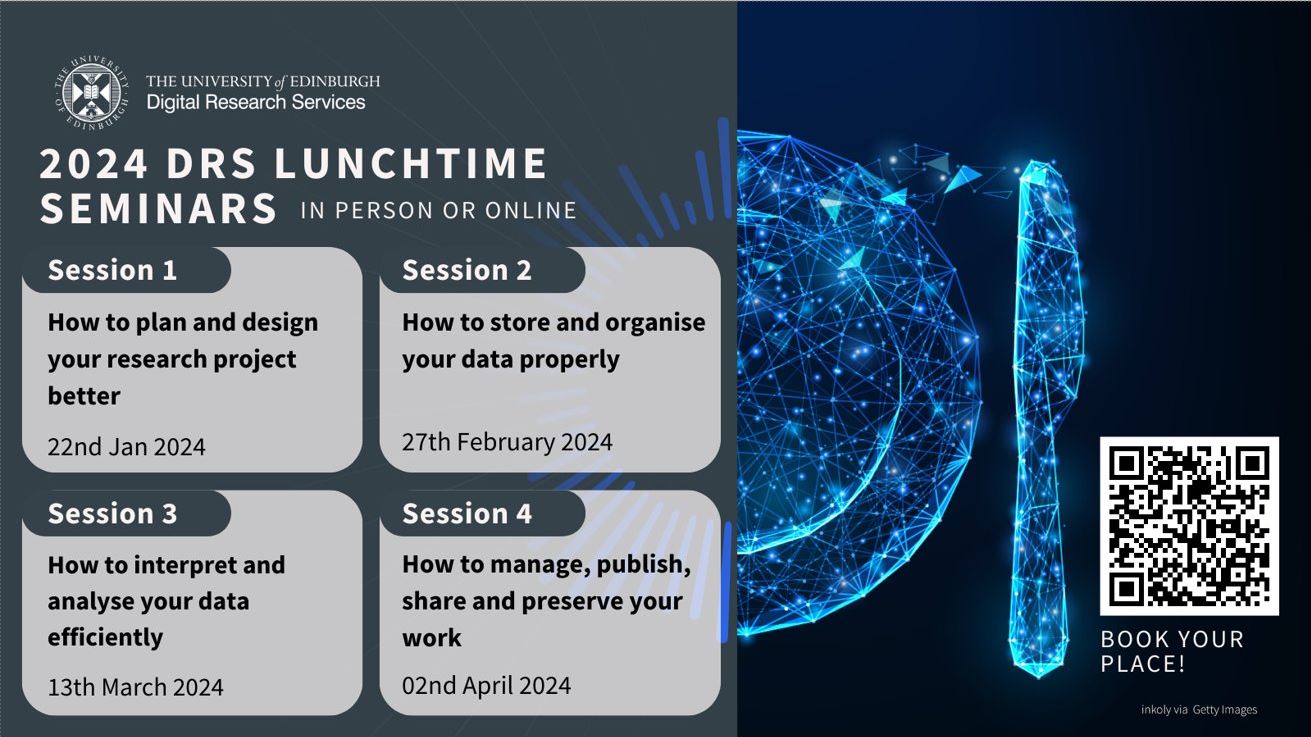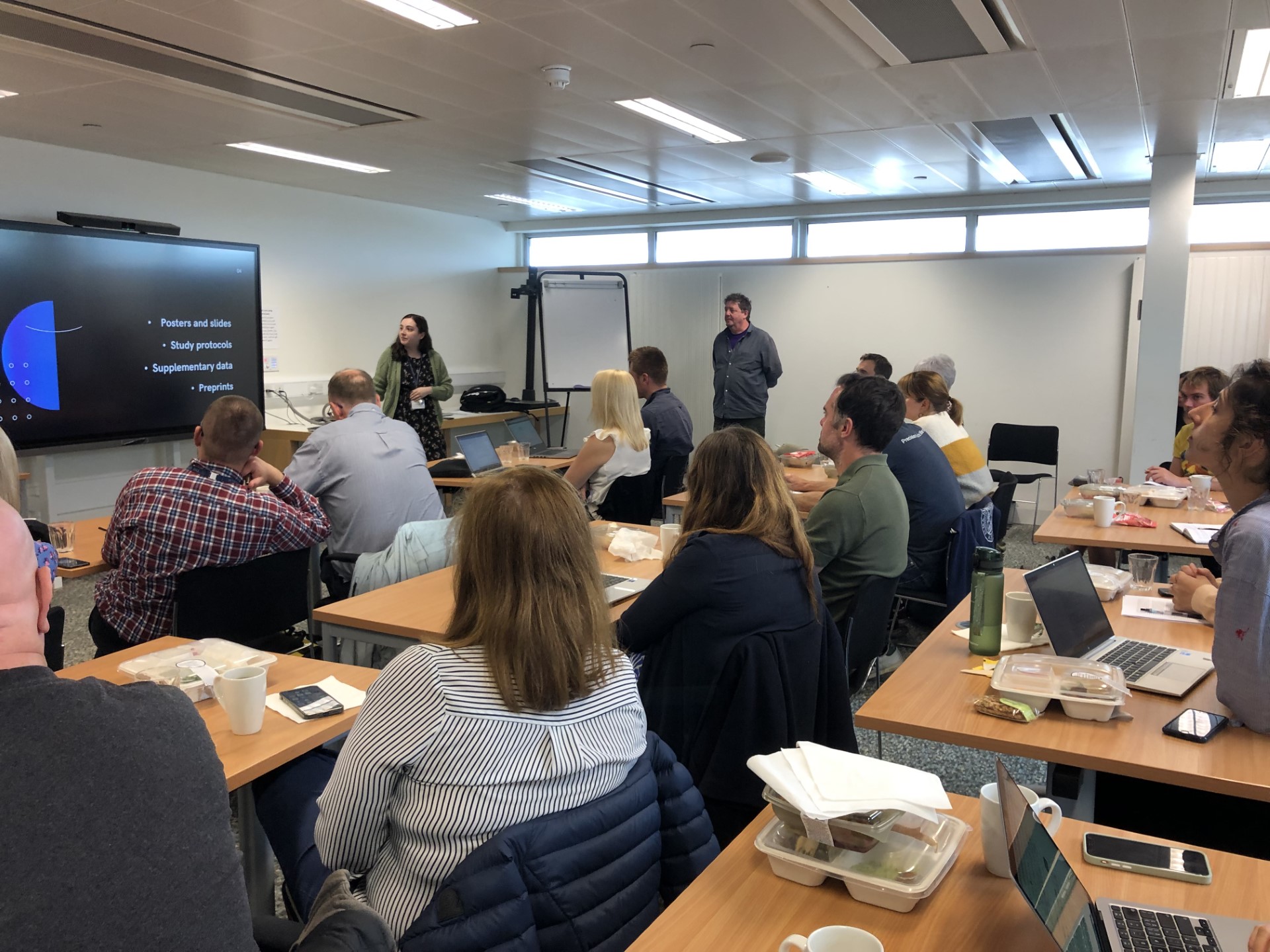| Research Services, IT Infrastructure Division, are pleased to report that a project that allows researchers to transfer terabytes of data between the University of Edinburgh and external collaborators has been completed. The service uses a transport mechanism known as Globus to set up multiple connections between host and client to transfer data instead of relying on a single point-to-point connection. This results in very large data being transferred between sites in parallel, allowing faster transfer.
The service is integrated with the University’s research data platform, DataStore, allowing researchers to specify specific folders that can be used as “endpoints” to the transfer. Many users have already taken advantage of the service, but it is key to note that this will not improve data transfer speeds within the University itself, rather that bottlenecks in the wider Internet can be mitigated. For more information, University of Edinburgh users may view the RSS Wiki. Mike Wallis |
Category Archives: Active data storage
Lunchtime Seminar Series – digestible bites of knowledge on data and computing tools at the University of Edinburgh
For 2023/2024, Digital Research Services have organised a new iteration of the Lunchtime Seminar Series. These one-hour hybrid seminars will examine different slices of the research lifecycle and introduce you to the data and computing expertise at the University of Edinburgh.
The seminars have been designed to answer the most common questions we get asked, offering valuable bite-sized learning opportunities for research staff, postgraduate research students, and professional staff alike. You will gain an understanding of how digital research fits in with wider research support teams and good research practices. Your sessions will cover research funding, research planning, tailored skill development, data management and advancements in AI.
Oh, and did we mention there is free lunch for in-person attendees? That is truly the cherry on top.

DRS Lunchtime Seminars – 2024 Calendar
Have a look at the upcoming seminars:
Seminar 1: How to plan and design your research project better. 22nd January 12:00 – 13:00
This session is all about making sure researchers head off with a strong start. Did you know that the University has tools that help you optimise your data management plan, with funder specific templates and in-house feedback? We will make sure you get the best use out of DMPOnline and the Resource Finder Tool. We will also introduce you to some key concepts in data management planning, research funding and digital skill development.
Seminar 2: How to store and organise your data properly. 27th February 12:30-13:30.
Discover how to best store and organise your data using University of Edinburgh’s tools: DataStore, DataSync and GitLab. If you work in a wet lab, you might be particularly interested in electronic lab notebooks. We will introduce you to the functionalities of RSpace and protocols.io. Finally, the University has just launched an institutional subscription to the Open Science Framework (OSF). You will discover that it is much more than a tool for data storage, as it can help manage complex workflows and projects as well.
Seminar 3: How to interpret and analyse your data efficiently. 13th March 12:00-13:00
This seminar is mainly about big computers, such as UoE’s Eddie and Eleanor. Through EPCC, researchers can get also access to large scale national supercomputers, such as Archer and Cirrus. At the same time, we will show a glimpse on some developments on the AI front.
Seminar 4: How to manage, publish, share and preserve your work effectively. 2nd April 12:00-13:00
The final seminar is all about making sure your work is published and preserved in the best way. We will talk you through different (open access) publishing pathways such as Journal Checker, Edinburgh Research Archive, Read & Publish journal list, Edinburgh Diamond. We will also be talking about data repositories (e.g. DataVault, DataShare) and our research output portal, Pure.
For info and booking:
https://digitalresearchservices.ed.ac.uk/training/drs-seminars
Blog post by Dr Sarah Janac
Research Facilitator – The University of Edinburgh
New Open Research Tool: Open Science Framework
Awesome news! The Research Data Service has a fantastic new addition to its Open Research toolbox! Fresh from the Centre for Open Science (COS) comes our institutional membership to Open Science Framework (http://osf.io): a powerful tool for supporting staff and students at the University of Edinburgh.

OSF is a free, open platform that provides full integration and sharing across the entire data lifecycle. Among many other things, it streamlines workflows with customisable project organisation and automated version control. It also enhances collaborative research, making it easy to find and connect with other UoE users and their research projects. But wait, there’s more! OSF enables easy management of private and public aspects of a project, so sharing with project teams as well as the wider research community couldn’t be simpler; it’s ideal for sharing preprints and preregistered reports. Best of all, with centralised storage for documents, data, and code, it eliminates the need to scramble around hunting for that one file you need right now: no more trawling through email chains to recover lost data!
To launch the new platform we’ve been running Free Lunch Lunchtime sessions, with Free Lunch in the Main Library. The Centre for Research Collections were kind enough to let us use their rooms on the 6th floor, so obviously, all our attendees used the stairs and worked up a proper appetite for their Free Lunch.
The first event was held on August 30th to a packed house, or room. After the Free Lunch and a bit of professional mingling, Gretchen Gueguen from the Centre for Open Science Zoomed in to give us a brief introduction to and overview of OSF: what it is, how it works, and why it’s such an excellent addition to any research toolbox. Gretchen was followed by Emma Wilson, PhD student, UoE representative for ReproducibiliTea, and Open Research Intern extraordinaire. Emma provided the first of two user-perspectives, talking about her experience of using OSF for her projects, presentations, and posters. The second pair of boots on the ground belonged to Mark Lawson, Data Governance Manager for the Childlight project currently being run out of Moray House School of Education and Sport. Being another long time-user of OSF, as well as being a fan of such tools, Mark spoke with great enthusiasm about the use of OSF to support the data management and project management aspects of his work.

Emma Wilson presenting during the OSF introduction event in August.
The second event wasn’t quite as packed as the first, but it was still nice to see those who managed to make it through the December wind and rain. Once again, Gretchen was there to provide the introduction and overview; and Emma, likewise, returned to talk about her experience as an OSF user. This time, the afternoon was rounded off by Gillian Currie who outlined the OSF training she and Eirini Theofanidou were ready and able to deliver. Before the close of the session Gillian had secured several bookings for her training sessions. Sadly, and despite having organised the event – and the Free Lunch – RDS won’t receive any commission for these bookings.
However, we will soon be in vigorous competition with Gillian and Eirini because we’re preparing to offer OSF Winter and Summer Schools. These sessions will be delivered remotely by COS to an in-person cohort of researchers over two or three days. If all goes to plan, we may even be recording the session recordings for future use. And yes, in case you’re wondering, there will, once again, be a Free lunch for attendees.
To learn more about the University OSF membership go to: https://edin.ac/47aGU0S. Questions about OSF? Email us: data-support@ed.ac.uk.
Dr Simon Smith – Research Data Support Officer
Research Data Support, Library & University Collections
New content in MANTRA: ‘Keeping research data safe’
We are pleased to provide an update on MANTRA, the free online research data management training resource.
The MANTRA course was developed around ten years ago to provide knowledge and training on a number of key research data management topics, including data management plans, effective organisation of data and files, and archiving and sharing research data at the end of a project.
As part of an ongoing update to MANTRA, six of the eight training modules have now been updated in order to refresh content and introduce new concepts and topics to better reflect current research data management practices and conventions.
Our most recent update is the new Unit 6: ‘Keeping research data safe’, which replaces the original ‘Storage and security’ unit covering how to store research data effectively, including keeping backups and methods to safeguard data. The new unit updates that content, and introduces a number of new topics including data classification, networked and cloud storage, password management tools, data access controls, transferring files securely, and working remotely.
Additionally, the new unit has been refreshed to include new images, videos and links to further reading to ensure it remains relevant and interesting to anyone looking to learn more about storing their research data safely and effectively.
In addition to this latest update, over the past year we have also reviewed and updated a further three modules:
- Unit 2: ‘Data management planning’ – Main updates include: new videos on the topic of data management planning from the Research Data Service, and new content covering planning of a broader range of research outputs (e.g. software code, workflows, methods and protocols), and information on software management planning.
- Unit 3: ‘Organising data’ – Main updates include: restructuring the content to make it easier to read and understand, and new pages on collaboration and working in teams, versioning files and using versioning tools, and managing software and code.
- Unit 8: ‘FAIR sharing and access’ – Main updates include: new videos, new pages on open data, the FAIR principles, making data FAIR, open data repositories, and data access statements, plus revisions to unit summary activities.
You can also read previous blog posts about updates to Unit 1: ‘Research data in context’ (blog post) and Unit 7: ‘Protecting sensitive data’ (blog post).
We hope you find time to visit MANTRA to see what is new and to learn more about looking after your research data effectively. We will be sharing more news on MANTRA as further updates are released.
Bob Sanders
Research Data Support Assistant, L&UC
